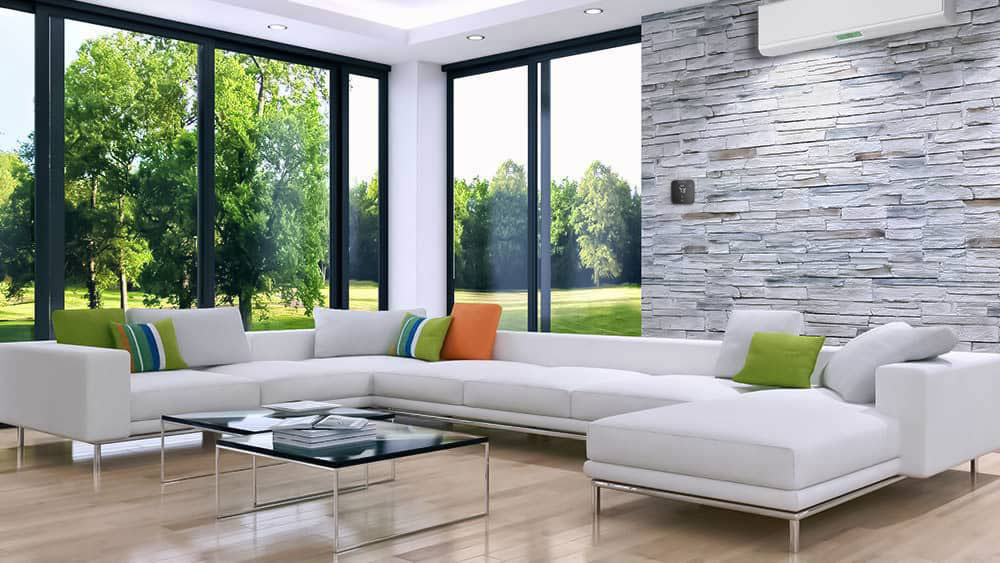
Key Takeaways
- Sealing air leaks and improving insulation can help reduce heat transfer, easing the burden on your AC unit.
- Using smart thermostats prevents unnecessary energy usage, helping to save on bills.
- Use fans for better airflow, clean filters often, and close blinds during peak sun hours to reduce AC load and save energy.
Apart from the bonfires, barbecues, festivals, and whatnot, the familiar cold & conditioned air during the summer months is an absolute must! It is that one thing that makes our days that much more comfortable. But as with all good things, there comes a downside. Continuous air conditioning usage contributes significantly to the monthly household electricity bills. According to a US Energy Information Administration (EIA) publication, air conditioning accounts for about 17% of home electricity expenditures, with the figure rising to 27% for humid regions. It is very important to monitor your air conditioner cost at the start of the season.
No one wants to spend $500+ monthly on air conditioning. It is in our best interests to reduce air conditioner electricity costs to a minimum without sacrificing comfort and convenience. Seems hard? We’ll make it a piece of cake with 16 super easy ways!
Reducing air conditioning bills doesn’t only help save monthly costs but also reduces harmful greenhouse emissions. With global warming reaching its peak, it’s about time we all adopt an eco-friendlier lifestyle.
Without further ado, let’s look into how to reduce AC bills very easily with these super easy ways.
- 1. Give Your Windows a New Lease of Life
- 2. Seal Your Windows for Air Leaks
- 3. Open the Windows for Some Night-Time Ventilation
- 4. Could You Turn off Your AC When You Don’t Need It?
- 5. Install a Programmable Thermostat or Deploy Smart Technology
- 6. Use Ceiling and Portable Fans
- 7. Replacing HVAC Air Filters
- 8. Make Sure Your Air Conditioner Is the Right Size
- 9. Don’t Skip Maintenance
- 10. Strategically Place Your Household Appliances
- 11. Insulate Attics and Garages
- 12. Use Blinds, Curtains, and Shades
- 13. Make Your Roof a Light Color
- 14. Install Solar Panels
- 15. Find Lower Ground
- 16. Plant More Trees
1. Give Your Windows a New Lease of Life
If your home has old windows, they probably are not that energy efficient. You can reduce the costs of cooling your homes by investing in new energy-efficient windows. Some initial investment will be required upfront; however, the savings they will bring will more than make up for it in the long-term.
Newer windows have an energy-efficient coating that will minimize the infrared and ultraviolet light that passes through the glass and into the home. This coating helps in both the winters and summers. During winter, these windows retain the indoor heat and do not let it escape. On the other hand, during the warmer months, the windows reflect the heat away, thus preventing the rooms from heating up. This significantly reduces the burden on your air conditioning, meaning reduced electrical bills!
Read our tips for building an energy-efficient home.
2. Seal Your Windows for Air Leaks
Badly sealed windows leak air. This means that the precious air that was just cooled leaves the room and allows cold air to enter. Your air conditioning unit will have to work much harder to cool your room and maintain the required temperature continuously. Sealing leaks or crevices prevents the cold air from seeping out of your windows, reducing the need to use the AC – thus saving energy!
Your best choice to make any mini-split, window,
or portable AC smart. Enhance your comfort and savings.

Before you begin to caulk and seal all of the leaks and cracks in your homes, the first step is to locate the house’s openings. Below are some of the most common sources of leaks and gaps:
- Plumbing and utility access
- Attic entrances
- Behind knee walls
- Dropped ceilings
- Door and window frames
- Air ducts
- Outlets and switches
- Water and furnace flues
Check as many areas as you can, and capture each and every gap!
3. Open the Windows for Some Night-Time Ventilation
There is an effortless and free-of-cost cooling technique – cross ventilation. Opening a couple of windows in a house or just one room helps circulate fresh air. This brings in cooler air from the outdoors to replace the warmer indoor air during the night. Fans can help speed up this process.
This is particularly advantageous for those households that reside in more northern, colder regions of the country.
Note – do not leave the AC on at night if you open the windows. Leaving the windows open places stress on the air conditioner, resulting in additional air conditioner usage and increased utility bills. You can switch your AC off and open the windows if the temperature allows.
4. Could You Turn off Your AC When You Don’t Need It?
Yes, this sounds blatantly obvious, yet you would be surprised about how careless households become when it comes to turning off the air conditioning.
When not using certain rooms of the home, don’t leave the AC switched on. If you leave the house, turn off the air conditioner so it is not working while you are out or at work during the day.
Sounds simple, right?
Sadly, many homeowners forget to turn off their air conditioners while going to work, school, or vacationing. Better still, get a smart AC controller like Cielo Breez that has geofencing – when you leave your home, the AC will shut down when you are over a certain mile radius away. The same when you return home, once nearby, the AC will turn on, ensuring the home is lovely and fresh upon your return.
5. Install a Programmable Thermostat or Deploy Smart Technology
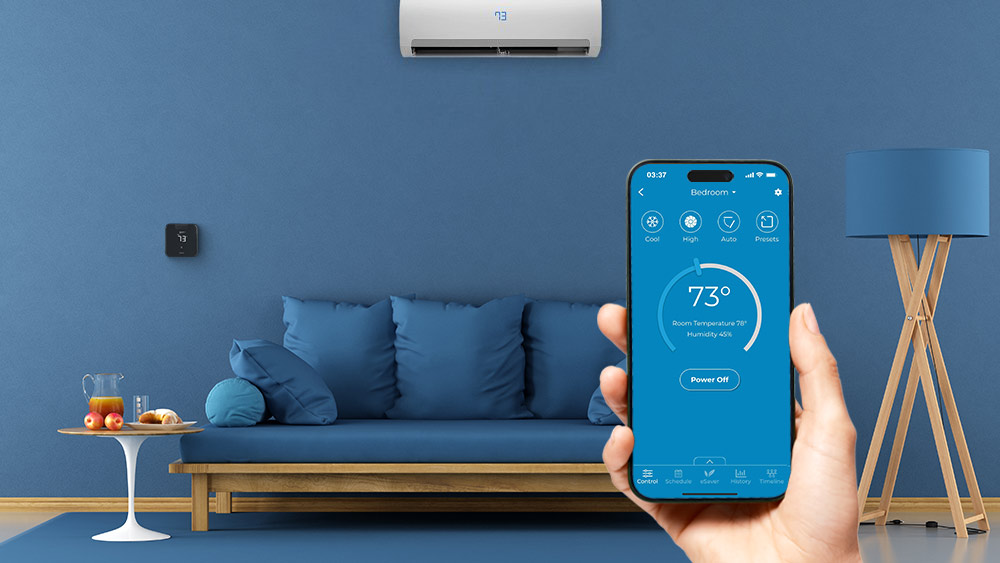
Smart technology deploys smart features that can significantly help save energy! For instance, smart air conditioners or smart thermostats allow you to set schedules for your AC or set intelligent triggers that help maintain a room’s climate. As soon as the desired temperature is received, your AC switches off, which helps save a lot.
Many people don’t bother to adjust their thermostats in hot weather. They crank it to the minimum possible temperature and leave it running there all day long. According to the Department of Energy, US households can save 10% annually by adjusting the room temperature by 7 to 10 degrees for eight hours a day.
A programmable thermostat can do this slight readjustment on its own. When you are away, it can sense, increase the set temperature by a few degrees, or completely turn the air conditioner off. Moreover, you can set up a schedule so that the air conditioner increases the set temperature by a few degrees when you are asleep and lower it back down again when you are about to wake up.
Pro tip: While smart air conditioners can be pricey, you can make any regular air conditioner smart using smart air conditioner controllers.
6. Use Ceiling and Portable Fans
Ceiling fans circulate fresh air, taking some of the burdens from your air conditioning units. Using existing ceiling fans (or installing them throughout the home) is a surefire way to increase a home’s energy efficiency.
Ceiling fans may be considered low-tech; however, they work miracles to keep rooms cool. A ceiling fan not only reduces a house’s air conditioning needs but also saves up to 40% in electricity costs.
Portable fans are a suitable option too. They can be strategically positioned around the house or a room and placed near the windows or doors and keep the room well ventilated.
Keep in mind, though, there is a difference between fans and air conditioners. Fans do not cool the air per se; they make rooms feel fresher and cooler because they move the air (and subsequently heat) away from the skin. With fans only using a small fraction of the energy that air conditioning units use, it saves so much more energy costs and is well worth it.
Bonus Tip: If you do get a ceiling fan, ensure that the blades are angled so that the air is pushed down towards the recipients and not up.
7. Replacing HVAC Air Filters
Air filters are vital to keeping an HVAC unit running smoothly and keeping your AC costs low. They prevent dust and other airborne pathogens from getting into the air stream and spreading around the house. Over time, these dust particles can accumulate on the filters and block them off. If the filters are dirty, the HVAC unit will have to work harder to circulate clean and fresh air around the house and thus end up consuming far more energy than required.
Even though air filters are crucial, they are often the most overlooked component of an HVAC system. To keep the air conditioners’ air filters in optimal shape, it is critical to have them checked, serviced, and regularly changed.
Homeowners should replace their HVAC air filters every one to three months, maybe more frequently if they have children or pets at home. Changing the air filters will do the following for your air conditioner:
- Prevent damage to the HVAC unit
- Block off dust particles more efficiently
- Save energy
8. Make Sure Your Air Conditioner Is the Right Size
The air conditioner’s appropriate sizing according to the area also plays an essential role in AC bills. A unit too small for a place would’ve to work harder, and a unit too big would use more energy than required to condition the room.
To know the air conditioner’s perfect size best suitable for your room, check out this article.
9. Don’t Skip Maintenance
For improved HVAC efficiency, you need to plan regular maintenance schedules for your heating/cooling system. Regular HVAC maintenance keeps your system running at full capacity. This saves you a lot in the longer run. On the other hand, if you keep skipping maintenance schedules, then things would keep piling up, making your HVAC work harder, giving you a hefty AC bill in the end.
10. Strategically Place Your Household Appliances
Many household appliances, such as freezers, refrigerators, cooking ranges, and stoves, emit a considerable amount of heat when in use. When positioning these appliances, it is recommended to keep them in well-ventilated and less occupied areas of the home.
Having a refrigerator in a homes’ living area will heat it considerably, forcing you to turn down your air conditioner’s temperature, further increasing your energy costs.
Similarly, when you are using your cooking range, keep the kitchen door closed or keep your kitchen well ventilated to prevent other home areas from heating up. Making sure of this can remove the strain from your AC.
11. Insulate Attics and Garages
Windows are just one place where the house leaks air. Attics, walls, and garage spaces leak air back and forth as well. Other than leaks, heat can transfer through the walls also during summer! As your conditioned air escapes your unit will have to work more to cool your home thus increasing your air conditioner costs.
Using a professional to insulate your home is one of the ideal ways to achieve energy efficiency. If the house is older, adding insulation to the existing structure can certainly be worth the investment.
By insulating the home, you prevent outdoor heat from getting inside. During the summer months, this can be a great energy saver, as you are keeping your home cool through passive means rather than employing air conditioning or other such methods.
Here is our guide on cooling your garage.
Here is our guide on cooling your attic.
12. Use Blinds, Curtains, and Shades
Air conditioning works harder in rooms that catch the sun and heat up like a greenhouse. A solution to block out the sun is to install blinds, particularly those that are light-colored. Even light-colored curtains or awnings will help block the sun.
Creative use of curtains, blinds, awnings, and other window shade treatments can help keep the house cool and, thus, your AC bills in check. The Department of Energy says that smart management of window coverings alone can decrease heat gain by up to 77 percent!
13. Make Your Roof a Light Color
As is the case with blinds and curtains, color matters when reflecting heat. Light colors reflect heat much better than darker colors, such as black.
Like how a black car or black shirt will get hot when outside in the sun, a dark roof will bake the rooms beneath, dark roofs can cause temperatures to rise to 150°F or more in the summer sun.
Lighter-colored roofs reflect the sun’s rays and heat, meaning that a house with a light-colored roof is naturally cooler than a house with a dark-colored roof. So, less energy and money are spent on air conditioning to cool it.
A roof that is a light color or made of reflective material, under the same sunny conditions, helps the home stay more than 50°F cooler as compared to a darker color, giving homeowners relief from both the heat and high energy bills.
14. Install Solar Panels
Typically, solar panels are installed on home roofs and utilize the sun’s energy to power a home. In return, they lower the cost of running an HVAC unit and overall impact on air conditioning bills. The investment you will need to pay for installing these panels depends on whether they are leased or bought as new. The panels are helpful in reducing air conditioner costs.
Moreover, solar panels are one way that homeowners can remove the risk of becoming the next casualty of high electricity bills.
Solar energy is a powerful way to produce renewable energy to power your air conditioner and also to provide energy for the remainder of your household appliances. They can provide electricity to your home at a fraction of the cost compared to getting power from a utility provider.
Furthermore, solar panel units will generate enough energy to save you thousands in electricity costs for well over 25 years. Although a long-term investment with a high initial price, it is indeed one that is well worth it.
15. Find Lower Ground
The roof of a home is directly exposed to the sun, heating the upper portion faster than the rest of the house. The upper part is then at a higher temperature than the rest of the home, requiring more cooling.
By spending most of your time on the ground floor and structuring your living arrangement so that a significant part of the day is spent downstairs, you can prevent the use of air conditioning on the upper portion of the home for a considerable amount of the day. Focusing on one area of the house can bring about a meaningful change in reducing your electrical bills caused by air conditioners.
At night time, when you are going to bed, you can then turn the air conditioner on and operate it at a slightly lower power setting. Read this article to learn about the ideal sleeping temperature and how to achieve it.
16. Plant More Trees
For an environmentally friendly way of saving energy and increasing natural scenic greenery, homeowners could plant more shrubs and trees, particularly on the south and west sides of the home. Planting bushes and other foliage-based greenery in front of windows blocks the sunlight from entering the house in the first place and absorbs the heat, resulting in cooler indoor temperatures.
Planting trees on the sides of your house, which face the sun, keeps your home in the shade for a significant part of the day. According to Energy.gov, carefully positioned trees can help save up to 25% on energy bills.
These are just a few of the measures which you can take to reduce your air conditioner costs. Keeping at it for a couple of months will surely save you valuable money on your utility bills. Now that you know how to keep AC costs down, you can enjoy the summers without worrying about your electricity bills! For more tips on saving energy, check out these 101 tips for an energy-efficient home.


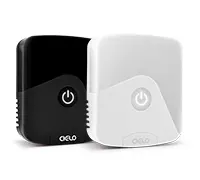


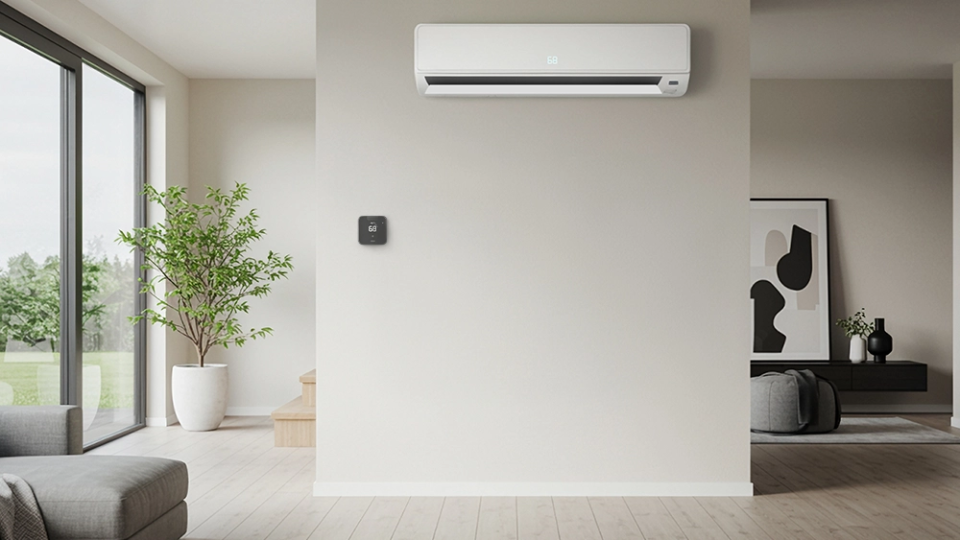
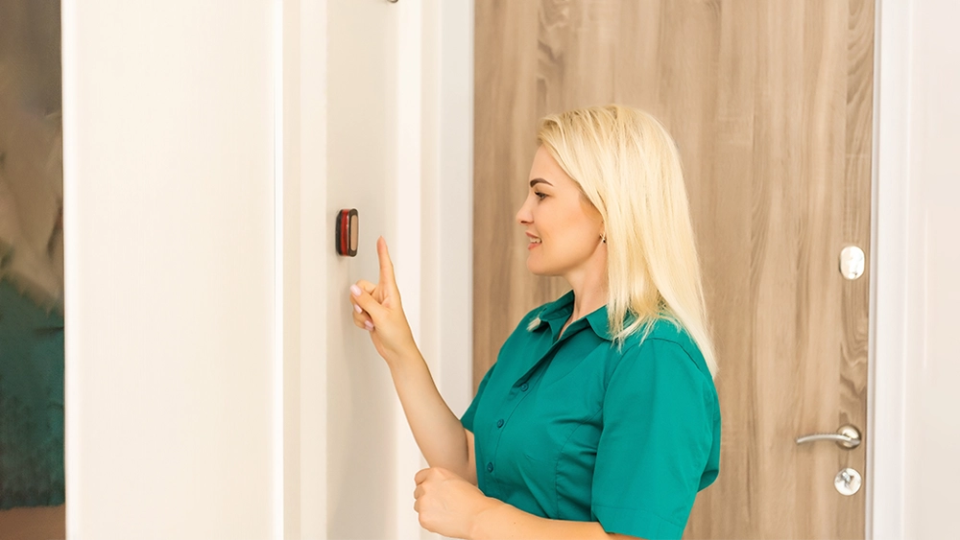
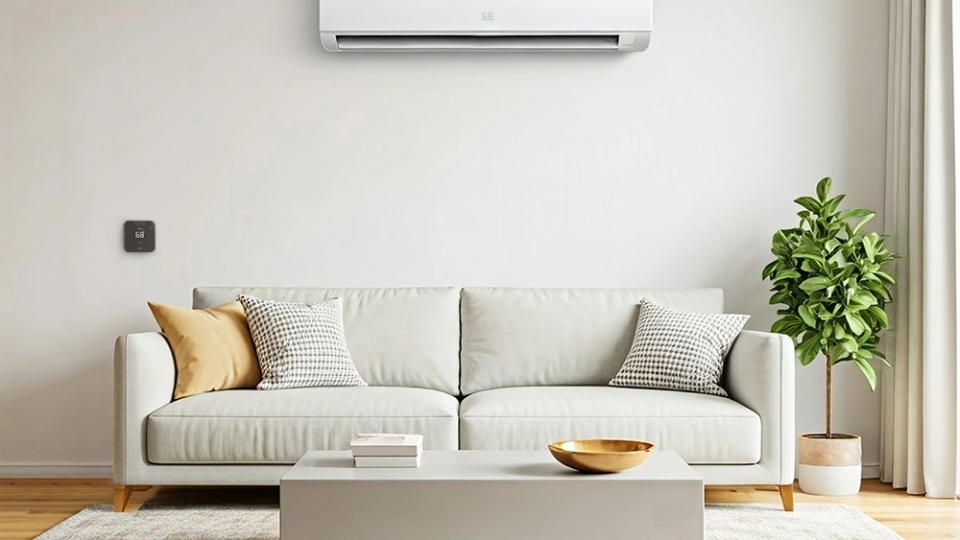

7 Comments. Leave new
This blog is very useful to reduce your AC costs.
Very fascinating, excellent work, and many thanks for sharing such an excellent blog.
Hello 🙂 Your post is very brilliant and fascinated, I like the idea and conce[tion. I retargeting main address for all friends Thanks!
Glad to see that this site works well on my Google phone , everything I want to do is functional. Thanks for keeping it up to date with the latest.
Stumbled into this article by chance but I’m sure glad I clicked on that link. Will certainly come back for more of this. Thank you so much
Yes reducing air conditioning bills doesn’t only help save monthly costs but also reduces harmful greenhouse emissions. With global warming reaching its peak, it’s about time we all adopt an eco-friendlier lifestyle. Your ways are very helpful.
I am trying to go greener in my everyday life. You mentioned that I can reduce the harmful greenhouse emissions coming from my house by reducing my air conditioning bill. I get to save money and the environment so that sounds like a great idea!